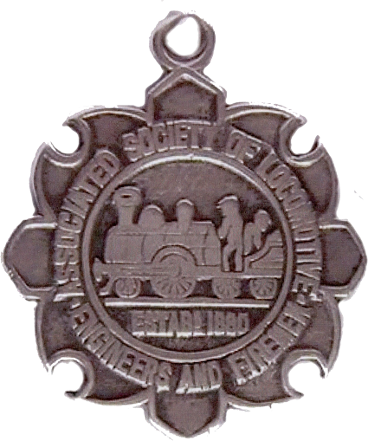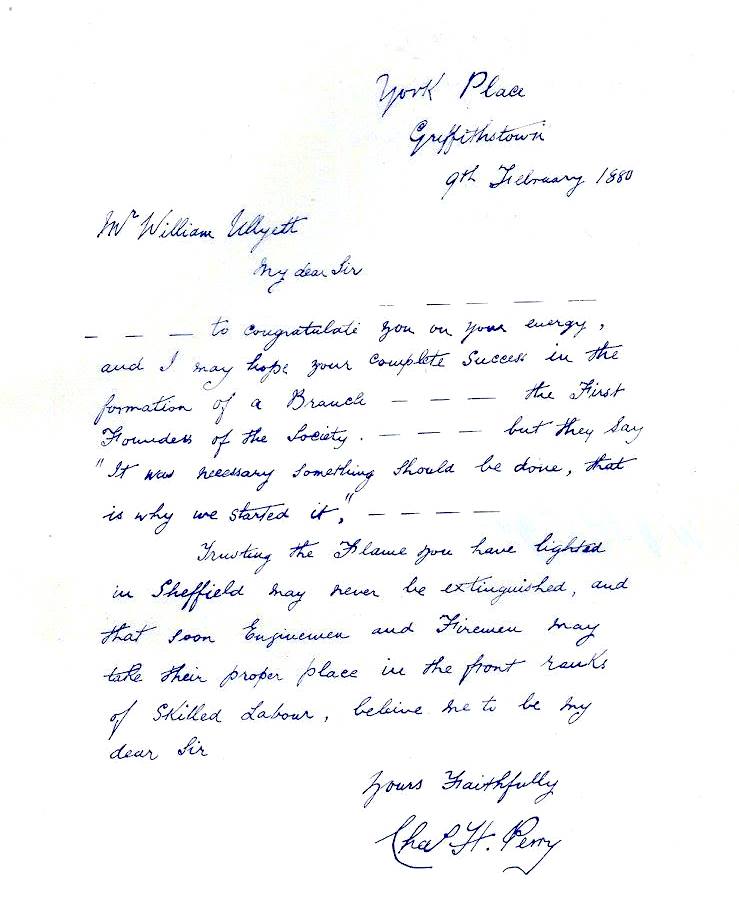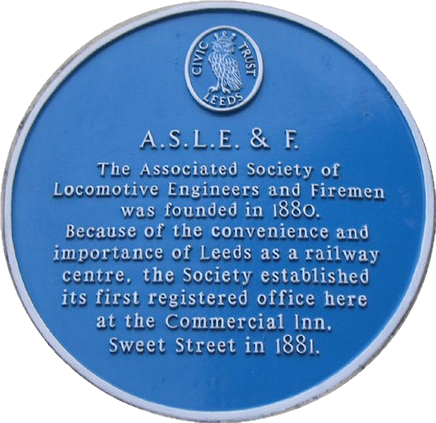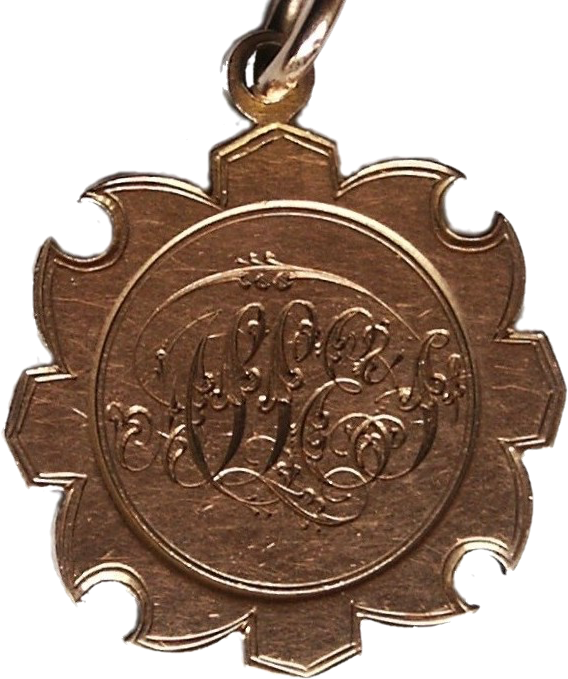

The railway boom produced by the industrial revolution brought both benefits and hardships for the workers employed on the railways. The decade of the 1870s had been an atrociously hard time for railwaymen. There had been many fatalities and accidents to men and boys in the service, and all were ‘wage slaves’ in a real grim sense. The system that brought vastly increased wealth to commerce, banks, mines, and all financial interests, was only a durance vile for the men who ran the system.
Of all the grades in the railway workforce, the engine driver enjoyed the highest pay and status of all but the chief engineer and stationmaster. On the other hand, no other industry brought together such a potentially lethal combination of heavy machinery, fire, steam, accelerating speeds and exhaustible labour. The result was an industry in which death and injury rates exceeded those of every other with the occasional exception of coal mining.
With the establishment of the Amalgamated Society of Railway Servants in 1871. This was an all-grade union and, at first, enginemen and firemen joined it enthusiastically. Within a year it had more than 17,000 members. But, in practice, it proved sadly ineffective and its membership soon began to fall. Moreover, its all-grade structure did not suit the precise requirements of locomotivemen with their own highly specialised skills who were exposed to their own particular dangers.There was some dilution of membership but the A.S.R.S. was regarded as too conciliatory by many enginemen and eventually the demand for a more militant and focused union to represent their views.
Something was about to happen to break the suppression, and the great venture was launched by the drivers and firemen. Seven men of Monmouthshire, stirred by the arbitrary attitude of the Great Western, breathed the great inspiration. The same project was being confidentially whispered at Birmingham, Sheffield, Bristol, and Leeds, and in 1880 it broke out spontaneously under the letters A.S.L.E. & F.
When the Great Western Railway restructured pay scales in October 1879, its longest serving enginemen and firemen found their wages cut and their working hours extended.
The Great Western enginemen realising there was not protection and got no support from the Amalgamated Society of Railway Servants (A.S.R.S.) with its friendly society attitude, and at that time, believed that disputes should be settled through arbitration, and never through costly, irresponsible and disloyal strike action.
So the Great Western enginemen framed a petition to theboard of directors protesting against the new and worse conditions. Sir Daniel Gooch, the G.W.R. Chairman. Examining their petition, he is said to have exclaimed: “Damn the signatures! Have you got the men to back them up?”
If locomotivemen banded together for protection in a trade union that avowed itself ready to
use the strike as a weapon of defence, every means would be taken to smash it – and them. Yet those fellows left that room with only one thought in their minds. Charles Perry, Evan Evans, Tom Harding, Tom Roderick and others started from scratch. The only funds they possessed were those they themselves would provide, but between October and December 1879 they contacted colleagues in Sheffield, Bristol, Pontypool, Newport and Birmingham.
They had lit the fiery cross which, in the coming years, was to burn steadily, its flame a
beacon to guide us and a light illuminating the path of our craft, and so also of every railway
worker in Britain.

William Ullyott of Leeds and 55 colleagues formed the first registered lodge of the Associated Society of Locomotive Engineers and Firemen in Sheffield.
A.S.L.E.F. COLLECTION
Meanwhile, the movement for a locomotivemen's union was gathering steam. The organising committee issued a set of rules in February 1880, drafted by Charles Perry, setting out the costs and benefits of membership.
Enginemen Charles Perry, Evan Evans, Tom Harding, Tom Roderick and others spent the next two months contacting their fellow ennginemen and firemen in Sheffield , Bristol, Pontypool, Newport and Birmingham. On Saturday 7th February, 1880, William Ullyott of Leeds and 55 colleagues formed the first registered lodge of the Associated Society of Locomotive Engineers and Firemen in Sheffield.
A momentous decision which prompted Charles Perry of York Place, Griffithstown,
Pontypool, one of the men who was instrumental in forming this trade union, to write to him
two days later:
'You will allow me in the name of our men to congratulate you on your energy and, I may hope, your complete success, in the formation of a branch and, at the same time, to inform you that the M&S men are the first founders of the Society. Your men have the honour of being the first members. Trusting the flame you have lighted in Sheffield may never be extinguished, and that soon enginemen and firemen may take their proper place in the front rank of skilled labour.'
The pioneers spent months in quiet branch building, exchanging views, creating basic rules
and communicating with each other, and looking forward when all enginemen and firemen
would be paid fairly and would be above the fear of dismissal for having dared to make a
reasonable request.

Letter from Mr. C.H. Perry of Newport to Mr. W Ullyott of Sheffield, having reference to the formation of the Society
The general register of the Associated Society of Locomotive Engineers and Firemen shows
how William Ullyott was the first member to join, at Sheffield, on Saturday 7 February 1880.
Charles Perry led the way a week later, when Pontypool opened its branch on Sunday 15
February. Tondhu followed on Sunday 4 April, Liverpool on Friday 23 April, and Leeds on
Saturday 24 April. Neath came in on Sunday 30 May, Bradford on Monday 28 June, and
Carnforth on Sunday 4 July.
The founding delegate conference of the new Society was held in the Falstaff Hotel, Market Place, Manchester on January 3, 1881. Charles Perry was instructed to submit his draft rules to the register of trade union and friendly societies.
To save on wages and travelling expenses, conference decided to vest authority in a single branch to elect a local committee to run the Societies affairs.
The executive committee met for the first time on Sunday 6 March 1880. It usually sat on
Sundays from 9.30am to 9.30pm. An attendance allowance of one shilling could be claimed – or, as Griffiths notes, 'forfeited when ten minutes late' – and union rules provided for loss of wages expenses, with a quarterly stipend for the treasurer. Executive Committee members
would be fined two shillings for missing a meeting without a satisfactory apology.
Around the country Enginemen and Firemen at different locations on different Railway Companies deciding to form their own Branches. A.S.R.S. begun to see many of their Enginemen and Firemen members transferring their membership from A.S.R.S. to the newly formed A.S.L.E.& F. Branches. In some locations the entire A.S.R.S. branch would transfer over to A.S.L.E.& F. This was because many Enginemen and Firemen had become very dissatisfied with the A.S.R.S. and wanted a trade union to represent the views of enginemen and firemen.

ASLEF COLLECTION
A.S.L.E. & F.’s first emblem
A.S.L.E. & F. branches were soon appearing on the London and Brighton Railway
and their formation and activities will appear on forthcoming pages.
A manifesto for the Associated Society of Locomotive Steam Enginemen & Firemen, dated
February 1880, says:
'We propose that a society be formed, consisting of enginemen and firemen only. Enginemen to pay 5 shillings, firemen 2 shillings.’
The first eight branches were established at
Bradford, Carnforth, Leeds, Liverpool, Neath, Pontypool, Sheffield, and Tondu.
'It was decided for reasons of economy that the affairs of our Society should be conducted by a committee elected from the Leeds branch, Leeds being chosen as the most convenient position for the movement, and the men at Leeds were vested with directing authority in January 1881.'
The first rule book of the Associated Society of Locomotive Engineers & Firemen was issued to members in 1881 as 'registered under the Trade Union Acts, with registered office at the Commercial Inn, Sweet Street, Holbeck, Leeds.'
7TH JANUARY 1881
ISOLATED ENGINEMEN'S SOCIETY
A meeting was held at Manchester on Monday to consider whether it was judicious to continue longer the efforts to establish an enginemen's trade union from which other grades in the Service would be excluded. It was a very small gathering, we are informed, but few stations taking notice of the invitation. We recently called minute attention to the attempts begun in 1879 to establish two separate engine-men's societies, under the titles of the " National Union" and " Associated Society." If it can be shown that any possible good would accrue from these efforts to cause division among railway servants, why do not the promoters state their case? The tendency of trade unions is to amalgamation, not to severances and divisions. The engineering trades, far more diverse in character than the varied occupations on a railway, found a basis for uniting their many societies in 1852 in face of a common danger. Hence the Amalgamated Society of Engineers. At this moment there are several schemes promoted for amalgamating the building trade societies into one confederation. Enginemen have made several attempts to establish isolated or exclusive societies, but each attempt has come to grief excepting the Friendly Society, which forewent its earlier character of a trade union. An enginemen's exclusive society would so offend other grades that, in the event of a struggle, the guards and others would be without sympathy for enginemen, and possibly the experiences of 1848, of 1866, and of 1867 would once again be repeated to the discomfiture of the locomotive men. How much better to ensure the co-operation and goodwill of other grades in the Service by joining with them in one common society. Whatever be the defects of the Amalgamated Society, they are remediable. This society ensures to enginemen every fair protection, and promotes the truest union, by joining all classes together. No other railwaymen's trade society has ever endured like the Amalgamated, or accomplished such work as it has wrought, and, on the verge of its tenth year, we find it as vigorous as ever it was, and grappling in a systematic manner with evils that touch all grades in the Service alike. The Associated Society of Enginemen is unfortunate instriking out against two such worthy associations as the Amalgamated Society and the Locomotive Steam Enginemen and Firemen's Friendly Society. The rumour that has been set afloat assuring men that the latter society would amalgamate with the Associated is devoid of truth. The old society's members would indeed be foolish if they placed their accumulated fund of £70,000 deferred sick pay, &c., at the disposal of the members of the younger society, taking up liabilities which would eventually ruin their now thoroughly sound society. Enginemen desire union, not separation, and they cannot do better than stand firm by the Amalgamated.
THE A.S.R.S
11TH FEBRUARY 1881
18TH FEBRUARY 1881
18TH FEBRUARY 1881
18TH FEBRUARY 1881

PHOTOGRAPHER UNKNOWN
16TH SEPTEMBER 1881
14TH OCTOBER 1881
Within a year, A.S.L.E.& F. had established a Central Executive –based for convenience on the Leeds branch – and had registered under the Trade Union Acts, its head office being the Commercial Inn, Sweet Street, Holbeck, Leeds. Leeds was chosen because of its size, the calibre of leading members and – crucially – its location on the lines of many of Britain’s major railway companies.
Its first general secretary Joseph Brooke. By 1884, membership had exceeded 1,000 and in
the course of the next two decades, the union’s membership grew from the hundreds into the
thousands.
THE RAILWAY REVIEW
3RD MARCH 1882
THE RAILWAY REVIEW
10TH MARCH 1882
THE RAILWAY REVIEW
10TH MARCH 1882
THE RAILWAY REVIEW
17TH MARCH 1882
THE RAILWAY REVIEW
3RD NOVEMBER 1882
A. S. L. E. & F. BRANCHES ON
LONDON & BRIGHTON RAILWAYA.S.L.E. & F. branches were soon appearing on the London and Brighton Railway the first branch being formed was
Battersea, Nine Elms and Longhedge in 1887
Brighton on the 25th August 1891
New Cross in January 1892
Portsmouth in 1895
(Incorporating L.B.&S.C.R. & L.&S.W.R. members)
Horsham on the 24th April 1898
(Incorporating Midhurst, Littlehampton & Bognor)
Eastbourne on the 25th February 1906
St. Leonards on the 25th February 1906
(L.B.&S.C.R. members)
Tunbridge Wells on the 25th February 1906
(Incorperating Three Bridges)
West Croydon in January 1908
Purley & Stoat’s Nest on the 21st March 1909
(Incorperating S.E.R. & L.B.&S.C.R. members (Couldson)
Peckham Rye on the 12th January 1912
Newhaven on the 16th July 1912
Three Bridges in 1913
Littlehampton in 1917
Selhurst in 1920
Epsom in 1920
Bognor Regis in 1925
London Bridge in c1928?
Brighton No. 2 in May 1934
(Incorporating West Worthing motormen)
Seaford on the 18th august 1935
Ore on the 1st December 1935
Norwood in 1936
Brighton 1988
Brighton No.1 in May 1934
Barnham in May 1995
Brighton on the 25th August 1891
New Cross in January 1892
Portsmouth in 1895
(Incorporating L.B.&S.C.R. & L.&S.W.R. members)
Horsham on the 24th April 1898
(Incorporating Midhurst, Littlehampton & Bognor)
Eastbourne on the 25th February 1906
St. Leonards on the 25th February 1906
(L.B.&S.C.R. members)
Tunbridge Wells on the 25th February 1906
(Incorperating Three Bridges)
West Croydon in January 1908
Purley & Stoat’s Nest on the 21st March 1909
(Incorperating S.E.R. & L.B.&S.C.R. members (Couldson)
Peckham Rye on the 12th January 1912
Newhaven on the 16th July 1912
Three Bridges in 1913
Littlehampton in 1917
Selhurst in 1920
Epsom in 1920
Bognor Regis in 1925
London Bridge in c1928?
Brighton No. 2 in May 1934
(Incorporating West Worthing motormen)
Seaford on the 18th august 1935
Ore on the 1st December 1935
Norwood in 1936
Brighton 1988
Brighton No.1 in May 1934
Barnham in May 1995
